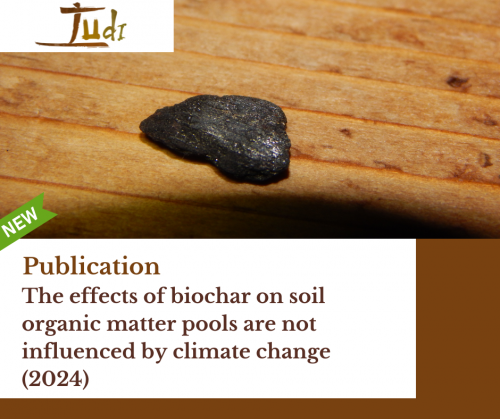TUdi article: The effects of biochar on soil organic matter pools are not influenced by climate change
TUdi’s article “The effects of biochar on soil organic matter pools are not influenced by climate change”, written by Beatrice Giannetta, César Plaza, Michele Cassetta, Gino Mariotto, Iria Benavente-Ferraces, Juan Carlos García-Gil, Marco Panettieri and Claudio Zaccone is published in the Journal of Environmental Management and available in the TUdi library.
The sustainability of Mediterranean croplands is threatened by climate warming and rainfall reduction. A possible amendment is the use of biochar to store organic carbon (C) in soil. Biochar is a stable, carbon-rich material which is highly resistant to decomposition, and thus can store carbon for hundreds to thousands of years. Still, to better understand the vulnerability of soil organic carbon (SOC) to the combined impacts of climate change and biochar application, it's essential to investigate its primary pools.
This article evaluates the effects of partial rain exclusion (an experimental technique used to study the impact of reduced rainfall on ecosystems) and temperature increase, combined with biochar amendment, on the distribution of soil organic matter (SOM) into particulate organic matter (POM) and the mineral-associated organic matter (MAOM).
A series of indices indicated that thermal stability increased with the addition of biochar in both the POM and MAOM fractions. Notably, the MAOM fraction was particularly enriched in labile substances. Data from micro-Raman spectroscopy revealed that biochar particles in the POM fraction had a more ordered structure. On the other hand, structural order in the MAOM fraction decreased, especially after climate manipulation.
Under conditions of climate manipulation (such as altered temperature or moisture), the study found crystalline Fe oxides, specifically hematite, in both the POM and MAOM fractions of unamended plots. However, these iron oxides were not detected in the same soil fractions under normal, ambient conditions. This suggests that climate changes can influence the presence and composition of certain minerals in the soil, affecting how organic matter interacts with these minerals.
In contrast, in the amended soil (where biochar was added), the climate manipulation did not lead to any changes in the types or forms of iron present (Fe speciation). This suggests that amendments to the soil may help stabilise its mineral composition, making it less susceptible to changes under varying climate conditions compared to unamended soil.
